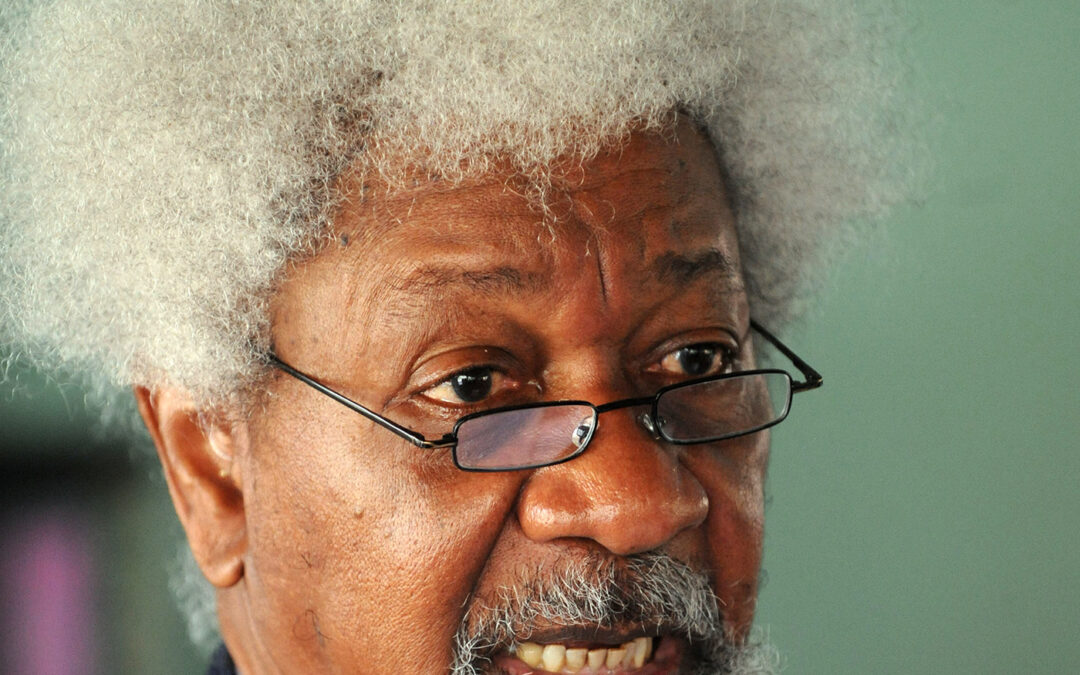This was after the broadcast to a global audience of Mazrui’s The Africans: A Triple Heritage, a famous TV and radio series. In a review of The Man Died: Prison Notes of Wole Soyinka, Mazrui did, in fact, describe Soyinka’s 1971 book as being irrational, and say that it was written in anger; an observation which Agyeman-Duah believes might have triggered their sometimes strong public disagreements. This manifested in the pages of Transition magazine which their friends, Kwame Anthony Appiah and Henry Louis Gates, Jr, publish with Soyinka as the chair of the editorial board.
Niyi Coker Jr.’s essay is a result of a young man’s fascination with the style of his country’s top writer. Agyeman-Duah describes Coker as having studied “with Soyinka as a sorcerer’s apprentice. As the young always grow, he pays, through good reflection in revered and humorous candour, back to the master.”
Writing their essay about “Uncle” Wole, who was once a Fellow at the Institute of African Studies, University of Ghana, the daughters of Efua Sutherland provide a very touching perspective and closure. They knew that Soyinka had come out of prison for alleged sympathies for secessionist Biafra. “Uncle” Wole often discussed a lot of Pan-African literary issues as well as politics with their mother in the sprawling estate of the Sutherlands in Accra; the similarities between their families, as the two sisters share memories of the 1970s.
Section Four of Crucible of the Ages and Essays in Honour of Wole Soyinka at 80 is sub-titled “The Museum, African Art and Music”. Three chapters centre around museum and antiquarian concerns as well as music. Zagba Oyortey and Malcolm McLeod, alumni curators of the British Museum in London share in their co-authored essay, the effects of globalisation and modern museum administration. And John Collins, the well-known British musicologist, guitarist, percussionist and university professor, has a joint essay written with Agyeman-Duah, entitled “The Protestants from Abeokuta: Fela Anikulapo-Kuti and His Cousin”.
An epic essay of Africa’s art history from past to present is contributed to the volume by the recently deceased Ekpo Eyo, the globally respected Nigerian art historian. The section’s discussions of ancient and, indeed, contemporary trends in art, and music, is profound.
Thematically, section five is “Poetry for The Threshold” which is described as “intergenerational and mostly for the occasion”. There are five poems, including one from the Nobel Laureate of St. Lucia in the Eastern Caribbean, Derek Walcott, and work by Atukwei Okai, Abena Busia, Aderonke Adesola Adesanya, Toyin Falola and co-editor Ogochukwu Promise (an award-winning poet, whose prizes include seven from the Association of Nigerian Authors), who is also known for her painting expertise and as the founder and coordinator of The Lumina Foundation in Nigeria. Agyeman-Duah serves as an advisor to the Lumina Foundation, which also runs the “Get Africa Reading Project”, through a Mobile Library.
Section Six, “Tradition and Modernity of Governance” is the final section and has essays by distinguished leaders who express their admiration for Professor Soyinka. The first, with traditional implications, is by the Ashanti King, Otumfuo Osei Tutu II, who discusses partnerships that traditional leaders must forge with politicians. The author of the well-received memoir, My First Coup d’Etat, President John D. Mahama of Ghana, sees Soyinka as a moral-teaching writer, who can make one confront bitter circumstances.
The final chapter, “Africa’s Renaissance and the New Partnership for Development”, by former South African President, Thabo Mbeki is a challenge to Africans to get involved in 21st century developments, if they wish to survive.
With launches at the University of Oxford and also with The Royal African Society and the British Library in the UK, as well as in Nigeria, Ghana, South Africa and the US, the book will certainly dominate discussions and activities in the milestone celebrations.
*Assensoh is Professor Emeritus of Indiana University and Courtesy Professor Emeritus in the History Department of University of Oregon in Eugene, Oregon, where he serves as a Mentor in the Gabon-Oregon Transnational Research Center. A licensed Attorney in the States of Indiana and Oregon, Yvette M. Alex-Assensoh is Professor of Political Science and Vice-President of Equity and Inclusion at the University of Oregon.
Read more: https://newafricanmagazine.com/6712/2/

